
 |
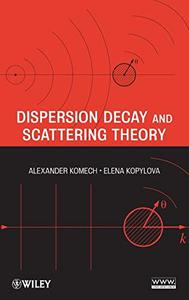 Dispersion Decay and Scattering Theory By Alexander Komech, Elena Kopylova(auth.) 2012 | 192 Pages | ISBN: 1118341821 | PDF | 4 MB A simplified, yet rigorous treatment of scattering theory methods and their applicationsDispersion Decay and Scattering Theory provides thorough, easy-to-understand guidance on the application of scattering theory methods to modern problems in mathematics, quantum physics, and mathematical physics. Introducing spectral methods with applications to dispersion time-decay and scattering theory, this book presents, for the first time, the Agmon-Jensen-Kato spectral theory for the Schr?dinger equation, extending the theory to the Klein-Gordon equation. The dispersion decay plays a crucial role in the modern application to asymptotic stability of solitons of nonlinear Schr?dinger and Klein-Gordon equations. The authors clearly explain the fundamental concepts and formulas of the Schr?dinger operators, discuss the basic properties of the Schr?dinger equation, and offer in-depth coverage of Agmon-Jensen-Kato theory of the dispersion decay in the weighted Sobolev norms. The book also details the application of dispersion decay to scattering and spectral theories, the scattering cross section, and the weighted energy decay for 3D Klein-Gordon and wave equations. Complete streamlined proofs for key areas of the Agmon-Jensen-Kato approach, such as the high-energy decay of the resolvent and the limiting absorption principle are also included. Dispersion Decay and Scattering Theory is a suitable book for courses on scattering theory, partial differential equations, and functional analysis at the graduate level. The book also serves as an excellent resource for researchers, professionals, and academics in the fields of mathematics, mathematical physics, and quantum physics who would like to better understand scattering theory and partial differential equations and gain problem-solving skills in diverse areas, from high-energy physics to wave propagation and hydrodynamics.Content: Chapter 1 Basic Concepts and Formulas (pages 1-9): Chapter 2 Nonstationary Schrodinger Equation (pages 11-24): Chapter 3 Stationary Schrodinger Equation (pages 25-36): Chapter 4 Spectral Theory (pages 37-57): Chapter 5 High Energy Decay of Resolvent (pages 59-69): Chapter 6 Limiting Absorption Principle (pages 71-88): Chapter 7 Dispersion Decay (pages 89-95): Chapter 8 Scattering Theory and Spectral Resolution (pages 97-109): Chapter 9 Scattering Cross Section (pages 111-131): Chapter 10 Klein?Gordon Equation (pages 133-150): Chapter 11 Wave Equation (pages 151-166): 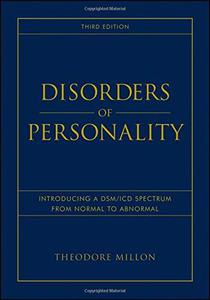 Disorders of Personality: Introducing a DSM/ICD Spectrum from Normal to Abnormal, Third Edition By Theodore Millon(auth.) 2011 | 1109 Pages | ISBN: 0470040939 | PDF | 12 MB Now in its Third Edition, this book clarifies the distinctions between the vast array of personality disorders and helps clinicians make accurate diagnoses. It has been thoroughly updated to incorporate the changes in the forthcoming DSM-5. Using the classification scheme he pioneered, Dr. Millon guides clinicians through the intricate maze of personality disorders, with special attention to changes in their conceptualization over the last decade. Extensive new research is included, as well as the incorporation of over 50 new illustrative and therapeutically detailed cases. This is every mental health professional's essential volume to fully understanding personality.Content: Chapter 1 Historical, Modern, and Contemporary Approaches to Personology (pages 1-62): Chapter 2 Sources of Personologic and Psychopathologic Development (pages 63-118): Chapter 3 Clinical Methods and Instruments of Personalized Assessment (pages 119-179): Chapter 4 Logic and Modalities of Personalized Psychotherapy (pages 180-231): Chapter 5 Classification Considerations, DSM?5 Prelims, and Proposals for Personology (pages 232-283): Chapter 6 Deferential Styles, Attached Types, Dependent Disorders: The DAD Spectrum (pages 285-329): Chapter 7 Sociable Styles, Pleasuring Types, Histrionic Disorders: The SPH Spectrum (pages 330-374): Chapter 8 Confident Styles, Egotistic Types, Narcissistic Disorders: The CEN Spectrum (pages 375-422): Chapter 9 Aggrandizing Styles, Devious Types, Antisocial Disorders: The ADA Spectrum (pages 423-475): Chapter 10 Reliable Styles, Constricted Types, Compulsive Disorders: The RCC Spectrum (pages 477-525): Chapter 11 Discontented Styles, Resentful Types, Negativistic Disorders: The DRN Spectrum (pages 526-571): Chapter 12 Abused Styles, Aggrieved Types, Masochistic Disorders: The AAM Spectrum (pages 572-615): Chapter 13 Assertive Styles, Denigrating Types, Sadistic Disorders: The ADS Spectrum (pages 616-659): Chapter 14 Apathetic Styles, Asocial Types, Schizoid Disorders: The AAS Spectrum (pages 661-707): Chapter 15 Shy Styles, Reticent Types, Avoidant Disorders: The SRA Spectrum (pages 708-753): Chapter 16 Dejected Styles, Forlorn Types, Melancholic Disorders: The DFM Spectrum (pages 754-797): Chapter 17 Ebullient Styles, Exuberant Types, Turbulent Disorders: The EET Spectrum (pages 798-828): Chapter 18 Eccentric Styles, Schizotypal Types, Schizophrenic Disorders: The ESS Spectrum (pages 829-889): Chapter 19 Unstable Styles, Borderline Types, Cyclophrenic Disorders: The UBC Spectrum (pages 890-952): Chapter 20 Mistrustful Styles, Paranoid Types, Paraphrenic Disorders: The MPP Spectrum (pages 953-1008): 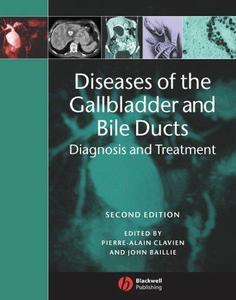 Diseases of the Gallbladder and Bile Ducts: Diagnosis and Treatment, Second Edition By 2006 | 435 Pages | ISBN: 1405127406 | PDF | 12 MB An interdisciplinary reference book for the diagnosis and treatment of gallbladder and bile duct diseasesWith recent developments in the management of hepatobiliary diseases including liver transplantation, this new edition aids all members of the team by addressing both the biliary indications for and biliary complications of these procedures.It's divided into three sections on anatomy, pathophysiology, and epidemiology; diagnostic and therapeutic approaches including the latest therapeutic modalities; and specific conditions. Includes more than 250 illustrations for rapid reference. Each chapter now has a Q&A section and begins with a list of objectives outlining the chapter's goals. In addition, a number of new imaging modalities are presented in this new edition.It takes an integrated medical, surgical and radiological approach, making this invaluable to all members of the team who deal with complications of liver transplantation and the management of patients.Content: Chapter 1 Anatomy and Physiology of the Biliary Tree and Gallbladder (pages 1-20): James Toouli and Mayank BhandariChapter 2 Pathology of the Intrahepatic and Extrahepatic Bile Ducts and Gallbladder (pages 21-57): Kay WashingtonChapter 3 Epidemiology of Diseases of the Bile Ducts and Gallbladder (pages 58-67): Markus H. HeimChapter 4 Noninvasive Imaging of the Biliary System (pages 69-96): Elmar M. Merkle, Rendon C. Nelson and He Nrik PetrowskyChapter 5 Endoscopic Diagnosis and Treatment of Disorders of the Biliary Tree and Gallbladder (pages 97-119): Kevin McGrath and John BaillieChapter 6 Percutaneous Biliary Imaging and Intervention (pages 120-146): Paul V. SuhockiChapter 7 Radiation Therapy for Disease of the Biliary Tree and Gallbladder (pages 147-162): Brian G. Czito and Mitchell S. AnscherChapter 8 Surgery of the Biliary System (pages 163-173): Lucas Mccormack, Markus Selzner and Pierre?Alain ClavienChapter 9 Laparoscopic Treatment for Diseases of the Gallbladder and Biliary Tree (pages 174-181): Stefan Wildi, Sarah K. Thompson, John G. Hunter and Markus WeberChapter 10 Laparoscopic Biliary Injuries (pages 182-204): Steven M. StrasbergChapter 11 Medical and Innovative Therapies for Biliary Malignancies (pages 205-214): Michael A. Morse and Bernhard PestalozziChapter 12 Natural History and Pathogenesis of Gallstones (pages 216-228): Beat MullhauptChapter 13 Acute and Chronic Cholecystitis (pages 229-238): Stefan Breitenstein, Armin Kraus and Pierre?Alain ClavienChapter 14 Biliary Fistula, Gallstone Ileus, and Mirizzi's Syndrome (pages 239-251): Henrik Petrowsky and Pierre?Alain ClavienChapter 15 Benign and Malignant Gallbladder Tumors (pages 252-262): John T. Mullen, Christopher H. Crane and Jean?Nicolas VautheyChapter 16 Acute Cholangitis (pages 263-276): Suyi Chang and Joseph LeungChapter 17 Cystic Diseases of the Biliary System (pages 277-288): Robert J. Porte and Pierre?Alain ClavienChapter 18 Biliary Complications of Liver Transplantation (pages 289-305): Mary T. Austin and C. Wright PinsonChapter 19 Primary Sclerosing Cholangitis (pages 306-331): Robert EnnsChapter 20 Cholangiocarcinoma (pages 332-339): Markus Selzner and Pierre?Alain ClavienChapter 21 Primary Biliary Cirrhosis (pages 341-352): Piotr Milkiewicz and Jenny HeathcoteChapter 22 Intrahepatic Cholestasis (pages 353-373): Andrew Stolz and Neil KaplowitzChapter 23 Biliary Disease in Infants and Children (pages 375-409): Riccardo Superina 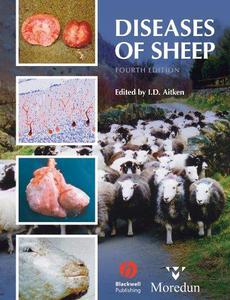 Diseases of Sheep, Fourth Edition By 2007 | 647 Pages | ISBN: 1405134143 | PDF | 11 MB First published in 1983, Diseases of Sheep has become a definitive reference book on sheep diseases. This new edition has been revised and updated to maintain its original core structure and its international approach to the many diseases which affect sheep. Any veterinary surgeon or agriculturalist who works with sheep will continue to find the information in this book the most authoritative and comprehensive available. Known to many as the "Moredun Sheep Book" because of its association with the Moredun Research Institute, long recognised as a centre of excellence in sheep disease research. Special attention is given to specific regional disease problems in the Middle East, Southern Africa, Australia, New Zealand, North America and South America. Covers technical aspects of disease prevention and treatment, including uncommon diseases, as well as sheep welfare issues. Content: Chapter 1 Sheep: A UK Perspective on a World Resource (pages 1-15): D. A. R. DaviesChapter 2 Sheep Welfare: Standards and Practices (pages 15-22): A. C. Winter and J. L. FitzpatrickChapter 3 Welfare of Fetal and Newborn Lambs (pages 22-27): D. J. MellorChapter 4 Sheep Welfare: Castration and Tail Docking (pages 27-32): V. Molony and J. E. KentChapter 5 Sheep Welfare: Transport of Sheep (pages 32-37): J. A. EarlChapter 6 Slaughter of Sheep (pages 37-43): D. C. HendersonChapter 7 The Reproductive Cycle and its Manipulation (pages 43-53): D. C. Henderson and J. J. RobinsonChapter 8 Ewe Management for Reproduction (pages 53-61): L. A. StubbingsChapter 9 Management and Care of Rams (pages 61-65): J. Vipond and A. GreigChapter 10 The Perinatal Period (pages 65-75): D. J. Mellor and J. C. HodgsonChapter 11 Genital Abnormalities, Obstetrical Problems and Birth Injuries (pages 75-81): J. C. Hindson and A. C. WinterChapter 12 Neonatal Conditions (pages 81-87): D. C. HendersonChapter 13 Ram Infertility (pages 87-94): A. GreigChapter 14 Prolapse and Hernia (pages 94-99): B. D. HosieChapter 15 Mastitis and Contagious Agalactia (pages 99-105): G. H. Watkins and J. E. T. JonesChapter 16 Chlamydial Abortion (pages 105-112): I.D. Aitken and D. LongbottomChapter 17 Toxoplasmosis and Neosporosis (pages 112-119): D. Buxton and S. M. RodgerChapter 18 Border Disease (pages 119-127): P. F. Nettleton and K. WilloughbyChapter 19 Other Infectious Causes of Abortion (pages 127-137): R. MearnsChapter 20 Brucella Melitensis Infection (pages 137-143): G. CastrucciChapter 21 Ulcerative Balanitis and Vulvitis (pages 143-149): A. GreigChapter 22 Diseases of the Oral Cavity (pages 149-156): A. L. Ridler and D. M. WestChapter 23 Clostridial Diseases (pages 156-168): C. J. LewisChapter 24 Mycobacterial Infections (pages 168-174): J. M. SharpChapter 25 Other Enteric Conditions (pages 174-179): R. C. GumbrellChapter 26 Cryptosporidiosis and Coccidiosis (pages 179-185): S. E. Wright and R. L. CoopChapter 27 Gastrointestinal Helminthosis (pages 185-195): F. Jackson and R. L. CoopChapter 28 Liver Fluke (pages 195-207): G. B. B. MitchellChapter 29 Acute Respiratory Virus Infections (pages 207-211): J. M. Sharp and P. F. NettletonChapter 30 Contagious Respiratory Tumours (pages 211-217): J. M. Sharp and M. De Las HerasChapter 31 Maedi?Visna (pages 217-224): G. C. Pritchard and I. McConnellChapter 32 Pasteurellosis (pages 224-231): W. DonachieChapter 33 Mycoplasma Respiratory Infections (pages 231-236): R. D. Ayling and R. A. J. NicholasChapter 34 Parasitic Bronchitis and Pneumonia (pages 236-241): F. E. MaloneChapter 35 Scrapie (pages 241-250): M. Jeffrey and L. GonzalezChapter 36 Louping?Ill (pages 250-255): H. W. Reid and F. ChianiniChapter 37 Listeriosis (pages 255-259): P. R. ScottChapter 38 Other Nervous Diseases (pages 259-273): P. R. ScottChapter 39 Diseases of the Feet (pages 273-282): J. R. EgertonChapter 40 Foot?and?Mouth Disease (pages 282-288): A. I. Donaldson and R. F. SellersChapter 41 Arthritis (pages 288-297): G. H. WatkinsChapter 42 Orf (pages 297-302): H. W. Reid and S. M. RodgerChapter 43 Sheep Pox (pages 302-306): R. P. KitchingChapter 44 Caseous Lymphadenitis (pages 306-312): G. J. BairdChapter 45 Staphylococcal Skin Infections (pages 312-315): P. E. McNeilChapter 46 Bacterial and Fungal Infections of the Skin and Wool (pages 315-321): J. PlantChapter 47 Sheep Scab (Psoroptes Ovis) (pages 321-326): P. BatesChapter 48 Other Ectoparasitic Conditions (pages 326-338): P. BatesChapter 49 Photosensitization (pages 338-342): A. FlaoyenChapter 50 Ocular Diseases (pages 342-347): B. D. HosieChapter 51 Tick?Borne Diseases (pages 347-359): Z. WoldehiwetChapter 52 Pregnancy Toxaemia (pages 359-363): N. D. SargisonChapter 53 Deficiency of Mineral Macro?Elements (pages 363-377): A. R. SykesChapter 54 Micronutrient Imbalance (pages 377-395): N. F. Suttle and D. G. JonesChapter 55 Diseases of the Urinary System (pages 395-405): N. D. Sargison and K. W. AngusChapter 56 Plant Poisoning in Britain and Ireland (pages 405-424): K. W. AngusChapter 57 Inorganic and Organic Poisons (pages 424-443): W. J. McCaugheyChapter 58 Tumours (pages 443-451): R. W. ElseChapter 59 Sarcocystiosis (pages 451-455): A. Uggla and D. BuxtonChapter 60 Bluetongue (pages 455-460): B. I. OsburnChapter 61 Rinderpest and Peste Des Petits Ruminants (pages 460-469): W. P. Taylor and T. BarrettChapter 62 Rift Valley Fever (pages 469-473): G. F. BathChapter 63 Akabane Disease (pages 473-483): P. D. KirklandChapter 64 Middle East and North Africa (pages 483-493): M. M. Rweyemamu and J. BerradaChapter 65 Southern Africa (pages 493-498): G. F. BathChapter 66 Australia (pages 498-504): J. PlantChapter 67 New Zealand (pages 504-509): A. L. Ridler and N. D. SargisonChapter 68 North America (pages 509-514): C. WolfChapter 69 South America: Pampas Areas (pages 514-519): L. A. O. RibeiroChapter 70 South America: Andean Highlands (pages 519-524): R. RosadioChapter 71 South America: Patagonia (pages 524-537): C. A. RoblesChapter 72 Flock Health Programmes (pages 537-544): R. N. Spedding, J. C. Hindson and J. A. EarlChapter 73 Pharmacology and Therapeutics (pages 544-573): S. Page and D. HennessyChapter 74 Anaesthesia and Common Surgical Procedures (pages 573-580): E. W. ScottChapter 75 Necropsy and Sampling Techniques (pages 580-601): F. Howie  Discrete Event Systems in Dioid Algebra and Conventional Algebra By Philippe Declerck(auth.) 2012 | 159 Pages | ISBN: 1848214618 | PDF | 3 MB This book concerns the use of dioid algebra as (max, +) algebra to treat the synchronization of tasks expressed by the maximum of the ends of the tasks conditioning the beginning of another task - a criterion of linear programming. A classical example is the departure time of a train which should wait for the arrival of other trains in order to allow for the changeover of passengers.The content focuses on the modeling of a class of dynamic systems usually called "discrete event systems" where the timing of the events is crucial. Events are viewed as sudden changes in a process which is, essentially, a man-made system, such as automated manufacturing lines or transportation systems. Its main advantage is its formalism which allows us to clearly describe complex notions and the possibilities to transpose theoretical results between dioids and practical applications.Content: Chapter 1 Introduction: Discrete Event Systems (pages 1-8): Philippe DeclerckChapter 2 Consistency (pages 9-52): Philippe DeclerckChapter 3 Cycle Time (pages 53-78): Philippe DeclerckChapter 4 Control with Specifications (pages 79-118): Philippe DeclerckChapter 5 Online Aspect of Predictive Control (pages 119-140): Philippe Declerck  A. Galasinska, M. Krzyzanowski, Micha? Krzy?anowski, "Discourse and Transformation in Central and Eastern Europe" English | 2009 | ISBN: 134935600X, 0230521029 | PDF | pages: 257 | 4.5 mb This volume explores the discursive nature of post-1989 social change in Central and Eastern Europe. Through a set of national case studies, the construction of post-communist transformation is explored from the point of view of accelerating and unique dynamics of linguistic and discursive practices. 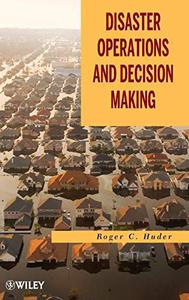 Disaster Operations and Decision Making By Roger C. Huder(auth.) 2012 | 373 Pages | ISBN: 0470927933 | PDF | 6 MB The only book to combine emergency management principLEs with proven military concepts Good disaster plans do not guarantee a good response. Any disaster plan rarely survives the first rain bands of a hurricane or the first tremors of an earthquake. While developing plans is essential, there must be systems in place to adapt these plans to the ever-changing operational environment of a disaster. Currently there is no set of standard disaster response principles to guide a community. The National Incident Management System (NIMS) and the Incident Command System (ICS) provide the framework to implement operational decisions, but they were never designed as operational concepts. The military has developed just such concepts and many of them can be adapted for civilian use. Disaster Operations and Decision Making adapts those military concepts and combines them with disaster lessons learned to create a new opera-tional paradigm. Emphasizing team building, Emergency Operations Center operational systems, and situational awareness, the book details easily adopted methods. All of these methods are designed to be incorporated into the NIMS and ICS framework to enhance a community's response to any type of disaster. Disaster Operations and Decision Making is an essential resource for emergency managers, fire chiefs, law enforcement officers, homeland security professionals, public health officials, and anyone else involved or interested in crisis management.Content: Chapter 1 The Emergency Manager: Leading in a Crisis (pages 1-18): Chapter 2 Crisis Decision Making (pages 19-37): Chapter 3 Disaster Operations: The Art of Operations (pages 39-66): Chapter 4 Decision Graphics: The Green Light System (pages 67-77): Chapter 5 The Emergency Operations Center (pages 79-109): Chapter 6 The Press, Friend and Foe (pages 111-126): Chapter 7 The National Incident Management System and the Incident Command System (pages 127-158): Chapter 8 Technology and Social Media (pages 159-171): Chapter 9 Building the Team: The Core Liaison Group (pages 173-188): Chapter 10 Training the Team (pages 189-275): Chapter 11 Resources: Decision Aids and Worksheets (pages 277-340):  Dioxins and Health: Including Other Persistent Organic Pollutants and Endocrine Disruptors, Third Edition By 2012 | 659 Pages | ISBN: 0470605294 | PDF | 4 MB Explores the latest science on dioxins and other POPs, and their impact on human health Now in its third edition, Dioxins and Health is the most respected reference of its kind, presenting the latest scientific findings on dioxins, dibenzofurans, polychlorinated biphenyls and related compounds, and their impact on human health. The book fully examines the many toxicological effects-including immunological, neurological, developmental, dermatological, and cardiological-these chemicals have on health. This Third Edition has been greatly expanded with the latest research findings on dioxins and related compounds. Moreover, it now includes coverage of other persistent organic pollutants (POPs) and endocrine disruptors, including: Brominated flame retardants, such as polybrominated diphenyl ethers and hexabromocyclododecane Perfluorinated chemicals such as perfluorooctanoic acid and perfluorooctanesulfonic acid Other endocrine disrupting chemicals similar to POPs such as bisphenol A Readers will also learn about the latest findings on the long-term impacts caused by the use of Agent Orange in Vietnam. Other chapters review the Seveso disaster in Italy and the Yusho and Yucheng rice oil poisoning incidents in Japan and Taiwan. In addition, there is a full chapter dedicated to the dioxin poisoning of former Ukraine President Victor Yushchenko. All the chapters in the book have been written by leading international experts. References at the end of each chapter guide readers to the primary literature in the field. Expertly organized in one volume, Dioxins and Health offers readers quick access to essential information about dioxins and related compounds written in clear, simple language that is accessible to not only scientists, clinicians and public health professionals, but also general readers.Content: Chapter 1 Persistent Organic Pollutants: An Overview (pages 1-35): Daniele Wikoff, Lauren Fitzgerald and Linda BirnbaumChapter 2 Toxicity Equivalence Factors for Dioxin and Related Compounds (pages 37-52): Michael DevitoChapter 3 Historic and Newer Persistent Organic Pollutants in Food (pages 53-88): Janice HuweChapter 4 Flame Retardants: Polybrominated Diphenyl Ethers and their Replacements (pages 89-108): Thomas F. Webster and Heather M. StapletonChapter 5 Pharmacokinetics of 2,3,7,8?Tetrachlorodibenzo?P?Dioxin and Related Compounds (pages 109-169): James R. OlsonChapter 6 Immunomodulation by Persistent Organic Pollutants (pages 171-192): Robert W. Luebke, Jamie C. Dewitt, Dori R. Germolec, Keith D. Salazar and Nancy I. KerkvlietChapter 7 Developmental Neurotoxicity of Dioxins (pages 193-227): G. Jean Harry and Pamela J. LeinChapter 8 Epidemiological Evidence on the Health Effects of Perfluorooctanoic Acid (pages 229-253): Kyle Steenland, Tony Fletcher and David A. SavitzChapter 9 Polybrominated Dibenzo?P?Dioxins and Dibenzofurans (pages 255-302): Kurunthachalam Kannan, Chunyang Liao and Hyo?Bang MoonChapter 10 Epidemiological Studies on Cancer and Exposure to Dioxins and Related Compounds (pages 303-358): Lennart Hardell and Mikael ErikssonChapter 11 Reproductive and Developmental Epidemiology of Dioxins (pages 359-379): Anne Sweeney, Deborah J. del Junco, Marcella Warner and Brenda EskenaziChapter 12 Bisphenol A (pages 381-413): Thaddeus T. Schug, Sarah A. Vogel, Laura N. Vandenberg, Joe M. Braun, Russ Hauser, Julia A. Taylor, Frederick S. Vom Saal and Jerold J. HeindelChapter 13 Phthalates: Human Exposure and Related Health Effects (pages 415-443): John D. Meeker and Kelly K. FergusonChapter 14 The Seveso Accident (pages 445-467): Angela Cecilia Pesatori and Pier Alberto BertazziChapter 15 Agent Orange: Health and Environmental Issues in Vietnam, Cambodia, and Laos (pages 469-520): Susan Hammond and Arnold SchecterChapter 16 The Yusho and Yucheng Rice Oil Poisoning Incidents (pages 521-551): Yoshito Masuda and Arnold SchecterChapter 17 The Binghamton, New York, Electrical Transformer Fire Incident of 1981 (pages 553-566): Nancy Kim and Arnold SchecterChapter 18 The Yushchenko Dioxin Poisoning: Chronology and Pharmacokinetics (pages 567-577): John Jake RyanChapter 19 POPs and Human Health Risk Assessment (pages 579-618): David T. Szabo and Anne E. Loccisano 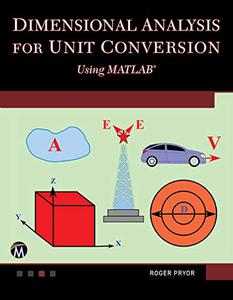 Roger W. Pryor, "Dimensional Analysis For Unit Conversion Using MATLAB" English | 2018 | pages: 179 | ASIN: B07HQSFFND | PDF | 12,8 mb This book and MATLAB app package will accurately convert values from one unit of measure to another using standard conversion factors. It performs conversions from and to the inch-pound system units used in the USA and the International System of Units (SI) as documented in the National Institute of Standards and Technology (NIST) publications of conversions for general use. There are 1,316 conversion factors available for bidirectional conversion from / to SI units, organized into 44 minor subsections by topic under eight major topical sections. There is also an alphabetical section comprising 445 conversion factors for unidirectional conversion to SI units. It also converts CGS and other "unacceptable" units (conversion factors not for general use, i.e. as in science, engineering, etc.). Companion Files with the software app are available by writing to the publisher with Amazon order number at [email protected].  Digital Marketing Strategic for Beginners: Digitalization in Marketing Strategic by Sydney Kelly English | 2022 | ISBN: N/A | ASIN: B09YMPWDXS | 85 pages | MOBI | 0.19 Mb Digital Marketing Strategic for Beginners |